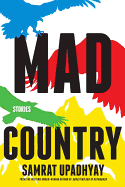
As a Nepalese native living in the United States, Samrat Upadhyay (The City Son, Buddha's Orphans) has a particular viewpoint on the connections between his former and adopted homes. And while Mad Country takes its title from a story set entirely in Nepal, other pieces in this collection of short works prove that the name could easily describe the United States. Indeed, Upadhyay's writing is best when it blurs the line between experiences, showing how people can conflate cultures as they look for meaning in their own lives.
That conflation is best represented in standout pieces like "Freak Street," in which an American from Ohio identifies so closely with her Nepalese hosts she begins to think of herself as native to a country she's lived in for six months. In the Kafkaesque "Dreaming of Ghana," a young man's dreams of an indistinct African country bleed into his real life, with heartbreaking consequences. And in the final story, "America the Great Equalizer," a Nepalese graduate student loses his sense of identity after the shooting of Michael Brown in Ferguson, Mo., and the resulting riots.
A lesser author might use such stories to push a "humans are all the same" theme or, worse, attempt to judge cultures against each other. But Upadhyay is less interested in culture clash than culture shock, and how people's identities can be rewritten in the face of that shock. If anything, that is the unifying theme Mad Country skillfully illuminates: the attempt by the psyche to re-create itself in the face of trauma. --Noah Cruickshank, adult engagement manager, the Field Museum, Chicago, Ill.

